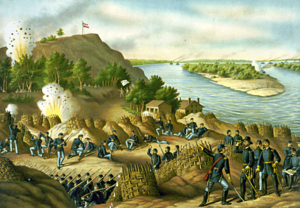Battle of Vicksburg
| Siege of Vicksburg | |||||||
|---|---|---|---|---|---|---|---|
| Part of the American Civil War | |||||||
 Battle of Vicksburg, by Kurz and Allison |
|||||||
|
|||||||
| Belligerents | |||||||
|
|
|
||||||
| Commanders and leaders | |||||||
| Ulysses S. Grant | John C. Pemberton | ||||||
| Units involved | |||||||
| Army of the Tennessee | Army of Mississippi | ||||||
| Strength | |||||||
| ∼ 77,000 | ∼ 33,000 | ||||||
| Casualties and losses | |||||||
|
4,835 total
(766 killed
3,793 wounded 276 captured/missing) |
32,697 total
(3,202 killed/wounded/missing
29,495 surrendered) |
||||||
|
Vicksburg National Military Park
|
|

Statue of General Grant at Vicksburg National Military Park
|
|
| Location | Vicksburg, Mississippi & Delta, Louisiana, USA |
|---|---|
| Area | 1,852.75 acres (749.78 ha) |
| Built | February 21, 1899 |
| Architectural style | Greek Revival |
| Visitation | 703,484 (2005) |
| NRHP Reference # | 66000100 |
| Added to NRHP | October 15, 1966 |
The Siege of Vicksburg (May 18 – July 4, 1863) was the final major military action in the Vicksburg Campaign of the American Civil War. In a series of maneuvers, Union Maj. Gen. Ulysses S. Grant and his Army of the Tennessee crossed the Mississippi River and drove the Confederate Army of Mississippi, led by Lt. Gen. John C. Pemberton, into the defensive lines surrounding the fortress city of Vicksburg, Mississippi.
Vicksburg was the last major Confederate stronghold on the Mississippi River; therefore, capturing it completed the second part of the Northern strategy, the Anaconda Plan. When two major assaults (May 19 and 22, 1863) against the Confederate fortifications were repulsed with heavy casualties, Grant decided to besiege the city beginning on May 25. With no reinforcement, supplies nearly gone, and after holding out for more than forty days, the garrison finally surrendered on July 4.
The successful ending of the Vicksburg Campaign significantly degraded the ability of the Confederacy to maintain its war effort, as described in the Aftermath section of the campaign article. Some historians—e.g., Ballard, p. 308—suggest that the decisive battle in the campaign was actually the Battle of Champion Hill, which, once won by Grant, made victory in the subsequent siege a foregone conclusion. This action (combined with the surrender of Port Hudson to Maj. Gen. Nathaniel P. Banks on July 9) yielded command of the Mississippi River to the Union forces, who would hold it for the rest of the conflict.
...
Wikipedia
